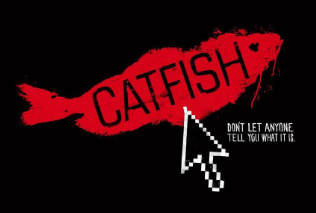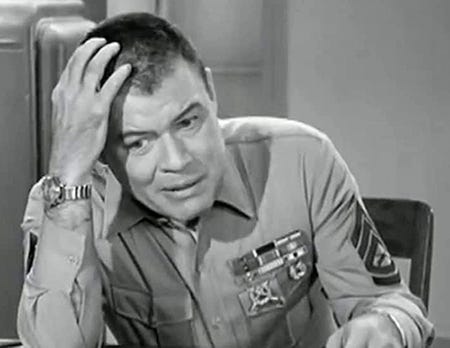Catfishing, as defined by the 2010 documentary, Catfish, and the 2012 series of the same name, is when people misrepresent themselves to others using a non-visual form of communication such as the internet or snail mail. The object of the catfishing—let’s call them the catfishee—thinks the person they’re talking to is completely different from who they really are. They might become close friends with the catfish, or even fall in love with them.
There are many reasons why a person might catfish: maybe they feel inadequate and want to impress the other person, or they feel a compulsion to catfish, or maybe they just do it for entertainment. Whatever the reason, catfishing is toying with someone else’s emotions for some kind of personal gratification. It may make the catfishee feel good temporarily, but when they find out what’s going on, they feel used, hurt, betrayed, and violated. In some cases, it could even ruin their lives.
Of course, during the age of classic sitcoms, the internet as we know it today didn’t exist, and the term “catfishing” hadn’t even been conceived. Still I can’t understand why so many sitcom writers thought old school catfishing made for funny plot points.
Here’s how it usually works...
There are two characters involved—let’s call them Dick and Jane. Jane is feeling a little down lately, and Dick wants cheer her up, so he comes up with what he thinks is a brilliant idea: he decides to write a letter to Jane pretending to be a fictional man who’s madly in love with her. Dick has clearly taken leave of his senses because he believes this plan will definitely make Jane feel better and couldn’t possibly go horribly wrong.
Dick invents a fictional man named Steel Hawthorne or some other ridiculous soap opera-esque name. Steel is a rich, handsome, globe-trotting brain surgeon and racecar driver who spends his spare time reading to the blind and volunteering at a children’s hospital and lots of other unbelievable stuff. Jane is thrilled that this rich, handsome, perfect man has the hots for her, and soon she starts talking about meeting him in person.
But fear not, Dick has a plan for just this scenario: he writes to Jane (as Steel) and tells her that while Steel is head-over-heels in love with her, he can never be with her because he’s moving to a remote village in Indonesia to provide free medical care to orphans or something, so while it breaks his heart, he can no longer contact her.
Of course, Jane is devastated that the man she loves will never write to her again. She falls into a deep depression much worse than the blues she was feeling before all this started. Who could have predicted that? Oh, only everyone on the planet! That’s why I find catfishing to be one of the stupidest sitcom tropes of all time.
Here are some examples of this idiotic trope in sitcoms through the years...
Gomer Pyle: USMC – “Love Letters to the Sarge” (1965)
Sgt. Carter (Frank Sutton) is depressed because everyone else is getting letters from women, and he gets nothing but junk mail. Gomer (Jim Nabors) feels badly for him, so he copies some lines from love poems and puts them together in a letter from a fictional woman he calls “The Mysterious Miss X.” He even goes so far as to buy some perfume to spray on it.
The sarge is smitten with his new secret admirer, and Gomer continues sending him letters from Miss X. The letters soon drive the sarge mad trying to figure out who the mystery woman is. He tries to stealthily question three women from around the base who he thinks could be sending the letters, but he determines that none of them are Miss X.
Soon, the other guys on the base get suspicious and insist the sarge invite the mystery woman to an upcoming USO dance so they can see what she looks like. To give him an out, Gomer writes the sarge a farewell letter from Miss X, telling him that she must leave him, and he will never see or hear from her again.
The sarge is devastated to learn that his secret love will no longer write to him, but his mood improves when he unexpectedly receives three more letters from the three real women he questioned the day before. He smugly tells the guys he can’t make it to the dance because it wouldn’t be proper for him to bring “three dates.”
Taxi, “Elaine’s Secret Admirer” (1979)
Elaine (Marilu Henner) is receiving anonymous love poems in the mail. At first, Louie (Danny DeVito) claims he wrote them, but when Elaine challenges him to recite some of his poetry, he fails the test.
Jim (Christopher Lloyd) confides in Alex (Judd Hirsch) that he’s the one who’s been sending the poems. He noticed Elaine had been feeling down lately, so he sent the poems as a way to cheer her up. Alex urges Jim to tell Elaine that he’s the secret poet, but Jim thinks she’ll be disappointed if she finds out it’s him because, as he says, “There are a lot of people in this world who think I’m a flake,” so Alex agrees to keep it a secret.
Elaine confronts a man named Don (Michael DeLano), who she thinks might be sending the poems. Don plays along and asks her to go away with him for the weekend. Alex insists that Jim tell Elaine he wrote the poems before she goes away with Don, and he finally confesses. Before Elaine storms out of the garage, she says bitterly, “I guess I should be happy about one thing: you finally got it through my thick skull that there aren’t gonna be any castles in my life.”
When Elaine gets home that night, she finds a castle built from scrap metal in her living room. Jim pops up out of it and says, “See? There are castles.” He explains that he built the castle out of pieces of his van: “Your castle has about 150,000 miles on it.” Elaine is touched, and as Jim heads for the door, they have an exchange that starts out sweet, then gets a little uncomfortable...
JIM: “I know I’m not every woman’s dreamboat.”
ELAINE: “You are the dearest, sweetest, most wonderful person.”
JIM: “I think you’re right. Funny thing...there used to be a time when that was enough.”
This exchange seems to indicate that perhaps Jim really does have feelings for Elaine, but since he knows Elaine doesn’t share his feelings, he won’t express them in order to spare her from having to reject him.
The Golden Girls, “Love, Rose” (1986)
Dorothy (Bea Arthur) and Blanche (Rue McClanahan) notice that Rose (Betty White) has been in a dating “dry spell,” so they encourage her to place a personals ad. Two weeks later, Rose finally receives a letter from a man who seems to have a lot in common with her. Blanche confesses to Dorothy that she wrote the letter to make Rose feel better about herself. Dorothy asks what Blanche will do if Rose wants to go out with the fictional man, whom Blanche has named “Isaac Q. Newton.” Blanche explains that she plans to say he has to move to Saskatchewan.
Dorothy and Blanche continue writing letters to Rose from Isaac, and Rose couldn’t be happier with her long-distance relationship. Eventually, Rose announces she has decided to tell Isaac she wants to meet him in person. When she walks away, Blanche asks Dorothy, "How do you spell ‘Saskatchewan?’”
As the gang gets ready to attend a fancy reception, Rose tells everyone she’s bringing Isaac as her date. She explains that she received a letter from him that said he’s being transferred to Saskatchewan on Tuesday, so she looked through all the phonebooks until she found the only listing for “Isaac Q. Newton,” called him, and invited him to the reception so they could meet before he left. The real Isaac shows up at the door, and he seems to be a nice guy, so Dorothy and Blanche keep quiet about their scheme.
At the reception, Rose becomes frustrated by Isaac’s cluelessness about his letters and confronts him, prompting Dorothy and Blanche to finally confess. Rose storms off and locks herself in the bathroom. Dorothy and Blanche apologize through the door and explain that they did what they did because they care about her. Eventually, Rose comes out, and they all hug and make up.
Cheers, “2 Good 2 Be 4 Real” (1985)
Carla (Rhea Perlman) tells the gang at Cheers that she’s depressed because she hasn’t received any replies to her personals ad, so Sam (Ted Danson) suggests they write to her to build up her confidence. He and Woody (Woody Harrelson), Norm (George Wendt), and Cliff (John Ratzenberger) put their heads together to create a fictional man named “Mitch Wainwright,” a pilot who’s conveniently always flying around the world. They begin exchanging letters with Carla as Mitch, and they even send her a photo that came with Norm’s wallet.
Carla is thrilled with her new jet-setting pen-pal, and she tells the gang she’s glad she found Mitch because if she hadn’t, she might’ve had to settle for someone like Vinnie Claussen, a real person who answered her ad a few weeks earlier. The guys try to encourage her to contact Vinnie, but she brushes them off.
Vinnie (Michael Alaimo) shows up at the bar, and Carla tries to send him packing, so Sam pulls her aside and confesses everything. Carla is furious, assuming it was all a big joke, but Diane (Shelley Long) explains that the guys did it to make her feel better. Carla reluctantly forgives them and agrees to give Vinnie a chance.
As they head out the door on their first date, Carla asks Vinnie if just for the night he could pretend his name is Mitch and he’s an airline pilot. Vinnie agrees if she’ll call herself “Raven” and pretend she’s a Vegas showgirl. Carla replies, “You’re weird. I like that.”
The Simpsons, “Bart the Lover” (1992)
While snooping through his teacher’s desk looking for his confiscated yo-yo, Bart (Nancy Cartwright) discovers that Mrs. Krabappel (Marcia Wallace) placed a personals ad in a magazine. As a joke, he decides to reply to the ad as a fictional man named “Woodrow."
Bart’s thrilled when he receives an eager reply to his letter, including a sexy photo of Mrs. Krabappel in black lingerie (“You’ve got a date with the Xerox machine”), so he continues his phony correspondence. When Mrs. Krabappel asks Woodrow for a photo, Bart sends her a picture of NHL player Gordie Howe, which he cut out of a book.
Eventually, Mrs. Krabappel tells Woodrow she wants to meet him, so Bart decides he has to end his game. He tells her to meet Woodrow at a fancy restaurant for a date, then watches through the restaurant window, thinking it’ll be the funniest joke ever. To Bart’s surprise, when he sees Mrs. Krabappel crying alone in the restaurant, he actually feels badly for her.
Bart tries to cheer up Mrs. Krabappel at school, but it doesn’t work, so he consults his family for help. Lisa (Yeardley Smith) suggests he send her one final letter “that says goodbye but lets her feel loved.” So the Simpsons work together to craft a letter that sensitively explains that Woodrow has to leave Mrs. Krabappel for reasons he can’t say, but he will always love her: “Anytime I hear the wind blow, it will whisper the name…Edna.”
Side Note: Coincidentally, in this episode, Todd Flanders (also Nancy Cartwright) is shown watching a TV show that’s clearly meant to be Gomer Pyle: USMC, the first show on this list. Perhaps the writers were paying homage to their inspiration.









